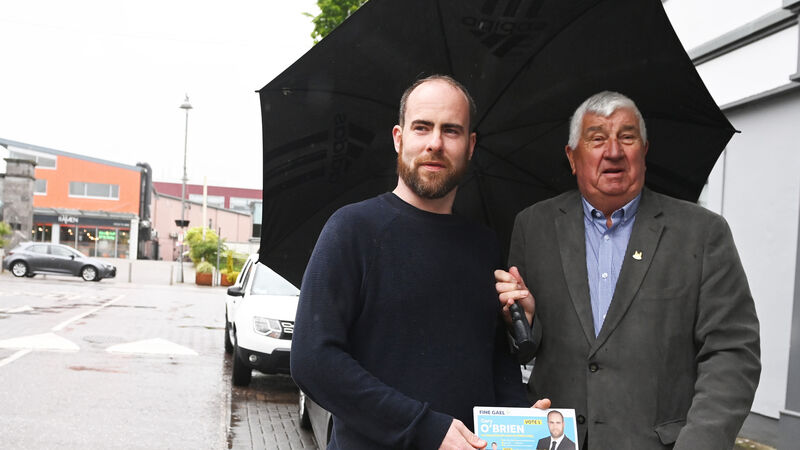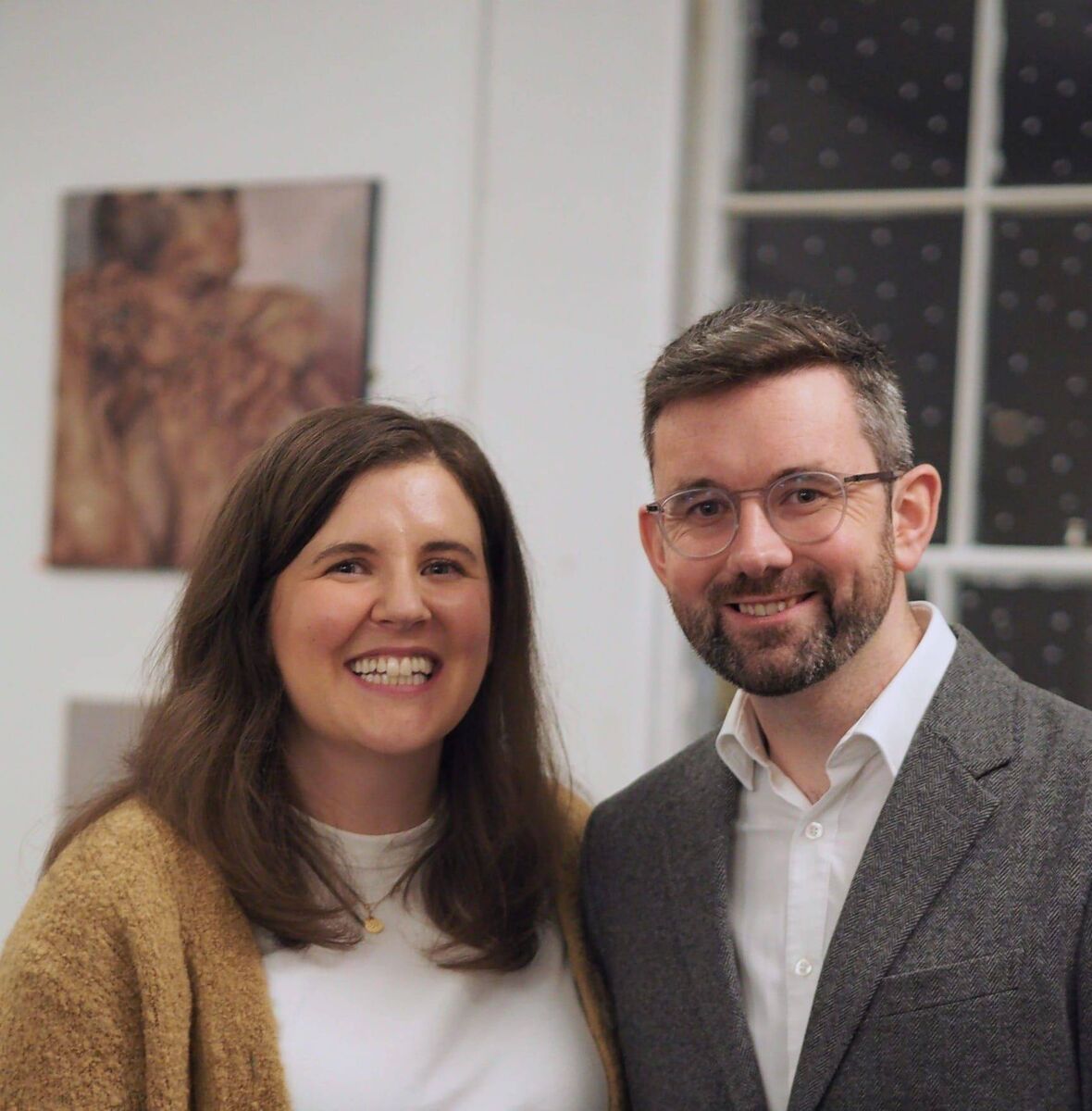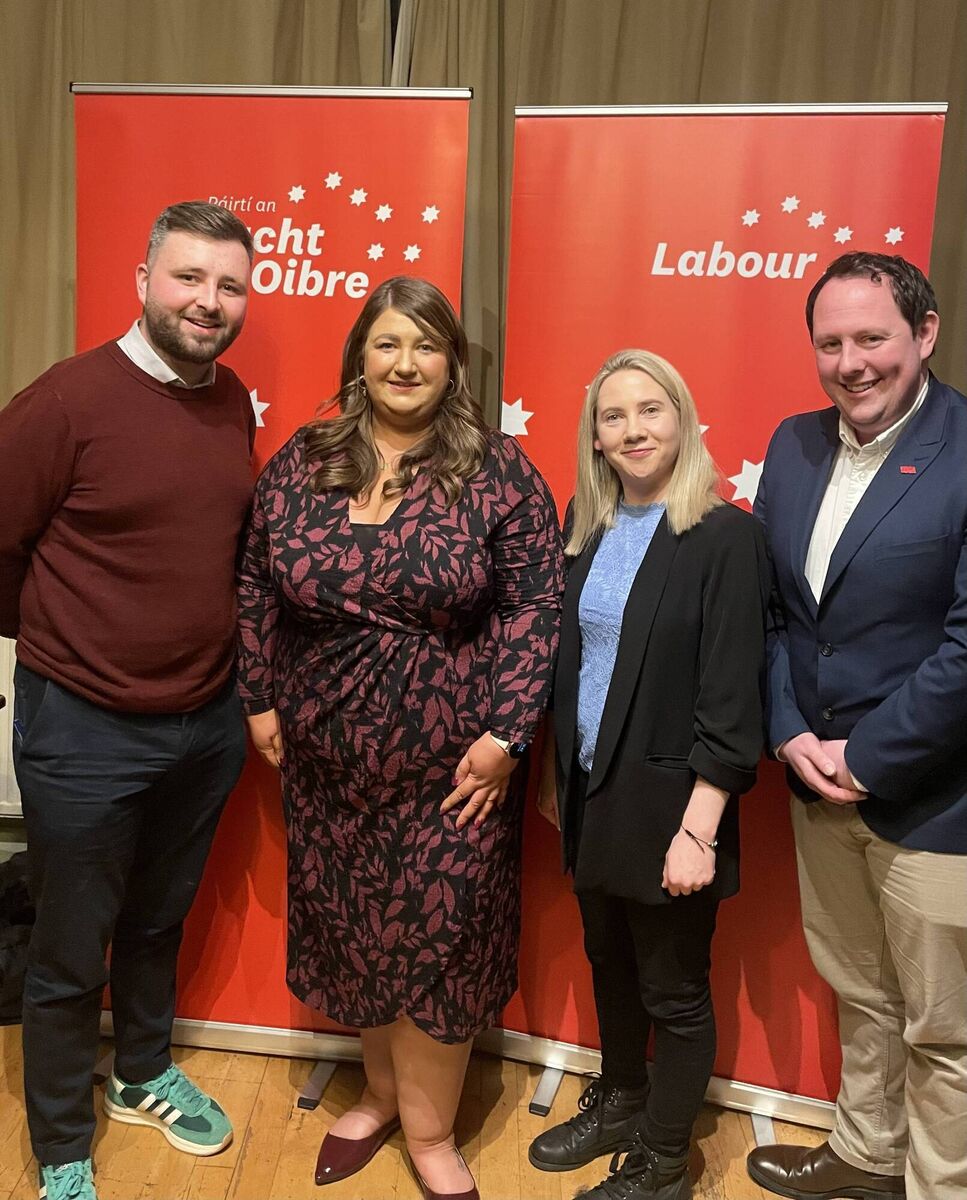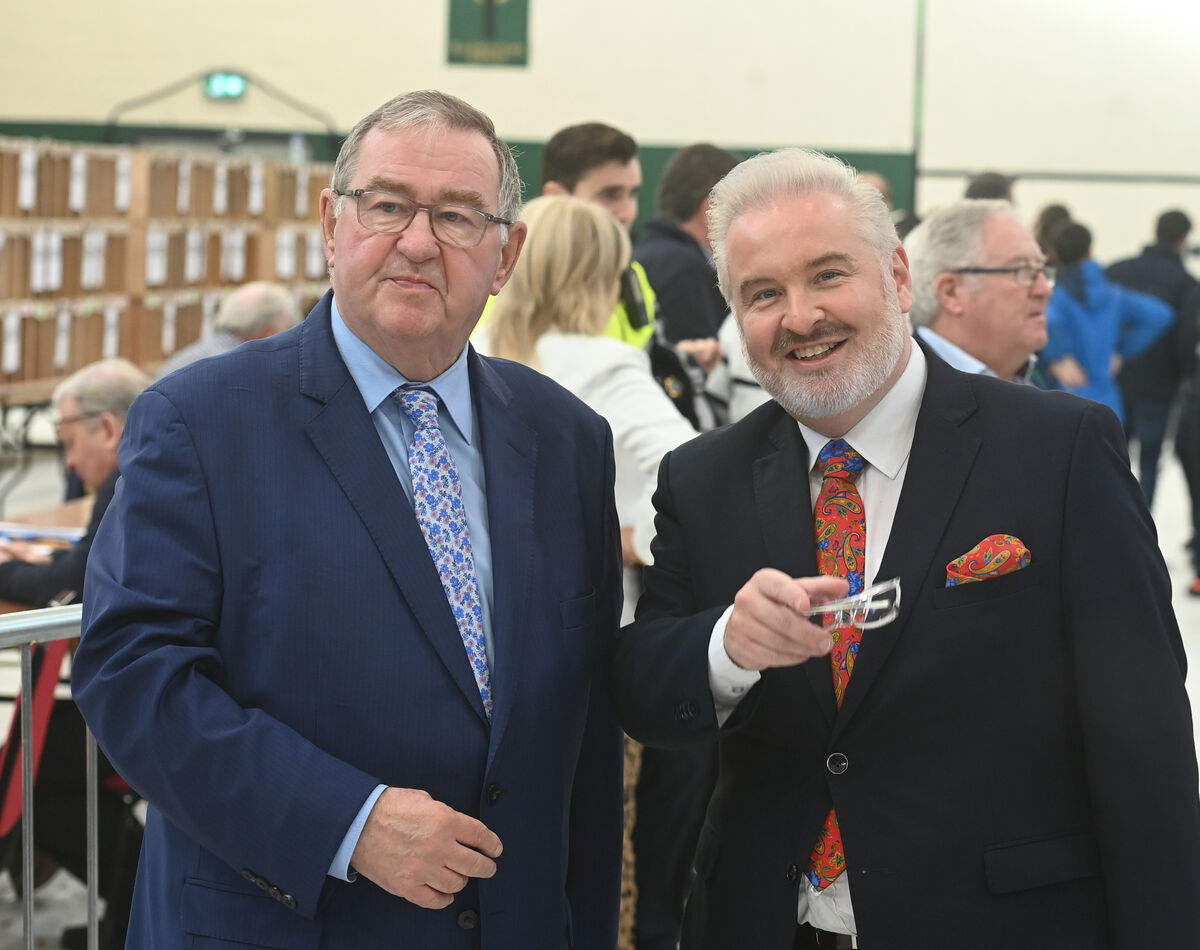'It makes a difference in people's lives': Co-opted Cork city councillors settle in to new roles

Fine Gael’s Gary O’Brien, here with retiring councillor Derry Canty canvassing in Ballincollig, who was co-opted onto the council following Garrett Kelleher’s successful Seanad run. Picture: Eddie O’Hare
WHEN Niamh O’Connor cast her vote for Pádraig Rice in the local elections last year, the last thing on her mind was that she would be replacing him by the end of the year.
“I was in early labour in the polling booth. I knew that day I should vote early,” said Ms O’Connor.
While she had been a member of the Social Democrats for a few years, the Barrack St-based solicitor said running for election had never crossed her mind and pregnancy had kept her from getting involved in the local election campaign. However, a physiotherapist advised her to get walking in the months afterwards, just as Mr Rice’s general election campaign was taking off and she spent months out on the doors.
But co-option never crossed her mind.
When a council seat is vacated, there is no such thing as a by-election. Instead, the outgoing councillor’s party nominates someone who is then co-opted by the council. After last year’s election, there were four spaces to fill —two in December after Mr Rice and Independent Ireland’s Kenneth O’Flynn were elected to the Dáil, and another two in February after the election of Labour’s Laura Harmon and Fine Gael’s Garrett Kelleher to the Seanad.
In some cases, someone is lined up to take a seat well in advance of it becoming vacant, but for Ms O’Connor it came out of the blue.
“I was very sure he would get elected, but I don’t think I ever put the two things together,” she said, as her mind was focused on getting him over the line. It wasn’t until after the election that the idea of co-option was brought to her, when Mr Rice approached her and encouraged her to put her name forward.

“If he hadn’t said that, I never would have gone for it. I had to get a little bit of a push,” she said. “Once it was said, I felt I had his faith I could do it. I didn’t look back once, I thought I could do it.”
As a solicitor, she had plenty of relevant experience and compares the council chamber to the court room. However, unlike most of the others in the chamber, a lack of fellow party members to help her was a challenge.
“I’m now the longest serving Social Democrat in the city council. I didn’t have that infrastructure. I have to carve that out.”
However, she said that other councillors have been a great help, as have council staff. As a member of the council’s progressive alliance with the Green Party and Labour, she singled out Oliver Moran of the Greens, along with her fellow southside councillors.
“Oliver has been unbelievably helpful and goes above and beyond. My ward colleagues as well. We get on incredibly well. We make decisions incredibly well.
“There’s not a huge amount of political point-scoring. It’s very collegial.”
Over the first few months of her council career, she worked on getting to grips with the structures and getting to know everyone, so that she could chart out a clear path for the next four years.
“I was a bit at sea at the start, I don’t know who wouldn’t be.
PLAN
“I didn’t get to go in with a plan, so I used that time to make a plan. Maybe it’s a bit idealistic, but I think what people want from councillors is the basics.”
From public toilets to cleaning up wheelie bins to improvements at The Lough, she has been identifying areas where she can make a difference.
“I want to target things that will help the area. We’re not going to solve world hunger, but we might get a playground for your kids. That makes a real difference in people’s lives.”
Ciara O’Connor found herself in a similar position in February, having never considered entering electoral politics until newly elected Labour senator Ms Harmon approached her.

Ms O’Connor had been involved in politics from a young age — her parents brought her to every election count and she became involved in unions and the Labour Party as a young adult. But running for election had never been on the agenda.
“I genuinely always saw myself as an activist,” said Ms O’Connor.
She worked closer with Ms Harmon to win a council seat last year, and again in the general election campaign and her successful Seanad campaign. But despite working so hard to get Ms Harmon elected to the Oireachtas, she did not think about putting herself forward to replace her in City Hall until she was approached by the new senator.
“Sometimes, women, we don’t see ourselves in those positions. Someone has to encourage you and tell you really. She was the person who told me.”
But after being approached, all the cogs started turning.
“I had been so focused on the count to see if she would get elected, and then all at once it hit me. I knew I had worked with Laura, I knew there was a good team in Cork City Council with John Maher and Peter Horgan. I knew I’d have the support.”
TERRIFYING
Within a fortnight, she was co-opted onto the council, a prospect that she described as “daunting” and “terrifying”.
But she settled in quickly, trying to get to know her fellow councillors and all the relevant staff straight away.
Her first big lesson was about how slow the wheels at City Hall turn.
“I found out things don’t happen quickly on the council. That was a bit of a reality check.”
Though she praised the engineers and other staff, she said she is still unsure why things move so slowly, especially as she has started to see results.
As someone who has worked in the early childhood sector for years, she understands the challenges many families are facing, and one of her first representations as a councillor was for a family she already worked with, who she assisted in getting housing.
“We managed to get them housed during the summer. Within a few months I could see the impact I could have. To be able to help people in your community like that — that really hits home.”
It’s cases like this that are teaching her how to navigate City Hall.
One of her current goals is to get public toilets installed at Murphy’s Farm in Bishopstown, which was immediately met with a no.
“If you don’t keep pushing, nothing will ever happen. But when you’re told no, you can try a different avenue.”
She said that she was told there was no budget for the public toilet, so now she is pushing for additional money to be made available in the upcoming budget so she can still move closer to her goal.
There is one councillor who did not need much time to figure out the quirks of City Hall — former TD Noel O’Flynn.
Last December, he made a surprise return from a 14-year political retirement to replace his son Kenneth, who was elected to the Dáil for Independent Ireland.
Mr O’Flynn was first elected to Cork City Council for Fianna Fáil in 1991 and then to the Dáil in 1997. He remained on the council until 2003, when the dual mandate restrictions were brought in, but continued on in the Dáil until 2011.
Now he is back on the council as an Independent Ireland member.
When he stepped back from the Dáil in 2011, he stepped back from politics too, though he quietly assisted his son behind the scenes.
So it came as a bit of a surprise last December when the new Deputy O’Flynn approached him about getting back into the game.
“It was after he was elected, he said thinking about this,” said Mr O’Flynn, who duly accepted and was back in City Hall, more than 20 years after he last served there.
CHANGE
A lot has changed in 20 years, but plenty has stayed the same, he says.
“The only thing that’s changed are the faces,” he said, but added that it is now a much bigger budget and a much bigger city.
He said that Cork City Council is “blessed” by its current senior management team, and said he sees his role as being to “assist everyone, the new members inside, for the betterment of the council and the betterment of the city”.
“I see Cork as a very important city. That’s why we need good leadership. Good, responsible leadership,” he added.
Something he was very keen to catch up on was the plans for the Cork City Docklands. As a councillor in 1999, he had led the charge for big change there but saw little happen during his remaining years on the council.

Now though, he sees that early work finally coming to fruition and is excited to be working with the new city council officials on it.
“Progress was very, very slow for a long time. But there’s a wonderful team there now. You’ll see huge changes now in the next few years.”
But something where the political veteran is in agreement with the new councillors is that it is not all about big projects, it is about “bread and butter issues” such as traffic calming, trees, and, in particular, housing.
“It’s mostly housing. People having to wait seven or eight years.”
That situation would have been unimaginable back in the early ’90s, despite Cork city being smaller and the economy being poorer.
“We always had problems with housing people. There was always a housing list. But it’s grown. It’s far from what it was in 1991.”
For Niamh O’Connor, Ciara O’Connor, and Noel O’Flynn, the local elections last year were a time of celebration as they watched the friends and family they had campaigned for get over the line, with no idea they would be the ones taking the seat.
For Fine Gael’s Gary O’Brien it was more bittersweet. He is the only one of the four co-opted councillors who was a candidate last year, having finished ninth in the seven-seat Cork City South West ward.
“I had resigned myself to the fact that it would be another five years. I was comfortable enough with that,” said Mr O’Brien.
Having had a good relationship with fellow Ballincollig man Garrett Kelleher, who was reelected to the council last June, he backed him in his Dáil run later in the year and his successful Seanad run in February. All of a sudden, his chance was there and he might not have to wait the five years.
Fine Gael was set to choose their co-optee through a convention, but Mr O’Brien was the strong favourite and, following a brief campaign seeking support, was selected unopposed.
“It was seen as a natural fit,” he said, as he already had a profile and could slot in to keep a councillor in Ballincollig.
He said his first council meeting was daunting.
“It was very overwhelming. I was never in the chamber before. I used to watch the meetings online. It’s a lot smaller in person. But I was delighted I had a second chance.”
Like the others, he put his early work into getting to know how everything worked.
“You really have to learn very fast,” he said, adding that building relationships and getting to understand the technical terms were big priorities.
His big takeaway is that you have to think outside your own box.
“While you’re a councillor for the South West ward, you’re a councillor for the whole city. You can’t just make decisions for your own patch.”
There is an adaptability and back and forth you need to master, he believes, using his goal to get a community centre for Ballincollig as an example.
It is a project he has been backing for a decade as a citizen, but being on the council has opened new avenues for him to pursue it.
“I’m sure I thought the council would sign off on it immediately. How naive I was, which I didn’t think I was.
“It’s definitely opened a lot of avenues, to be fair. They do that on a lot of things. ‘We can’t do everything you’re suggesting, but we can do part of what you’re suggesting and part of something else.’ They are open to all kinds of suggestions and collaborations.”
He said that by being adaptable, by finding agreement where he can, big progress can be made on getting a project like that advanced before the next election.
That is both the big challenge and the big opportunity for all four co-opted councillors. While they were not elected to the seats, they will be holding them for almost the full term, before facing re-election. Convincing people is hard work, but four years is also a lot of time to get things done.
That is how Mr O’Brien is looking at it anyway, saying he will be keeping his focus on answering people’s queries and trying to solve their problems.
“Hopefully, people in four years’ time will say ‘he did respond to our email, he did tell the truth’. Once I can look back in four years and say I’ve done my best, I’ll be content.”









 App?
App?


